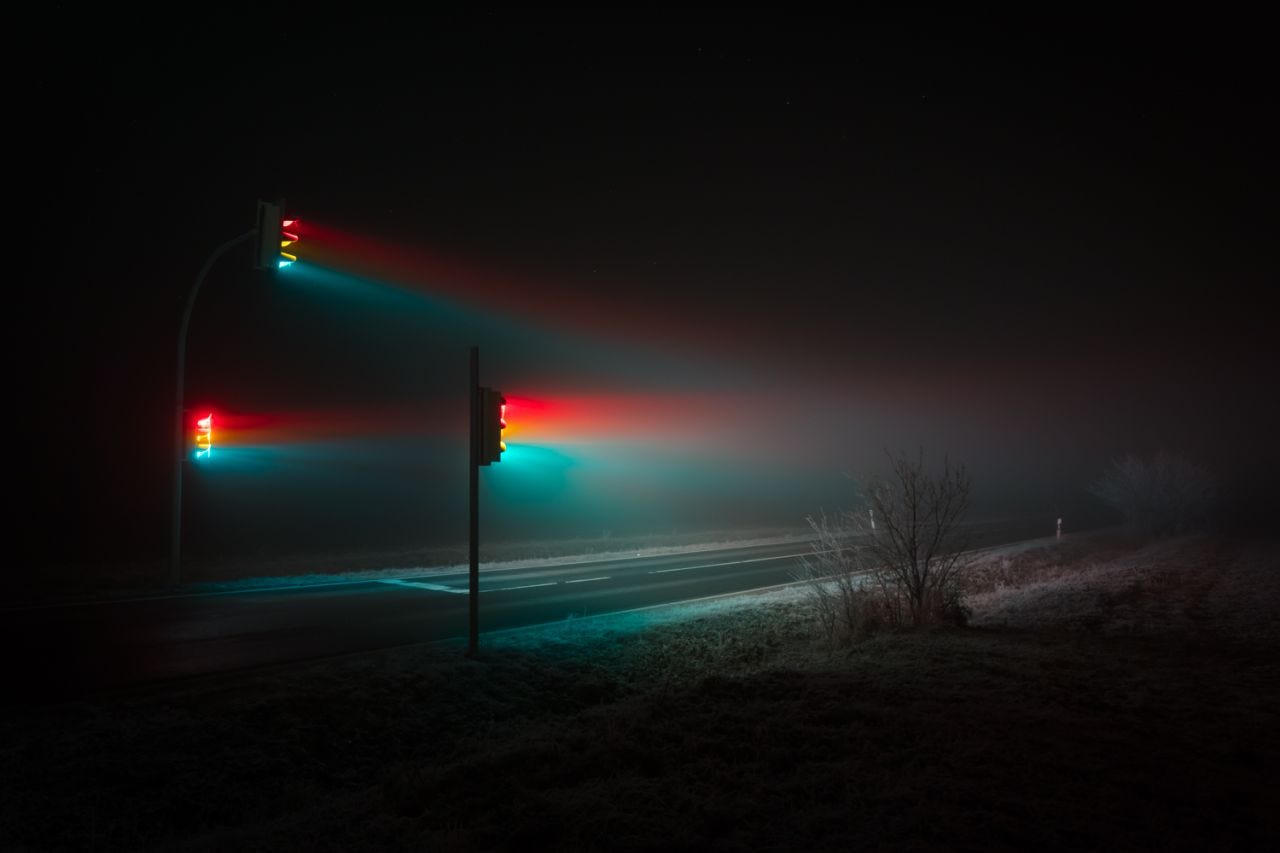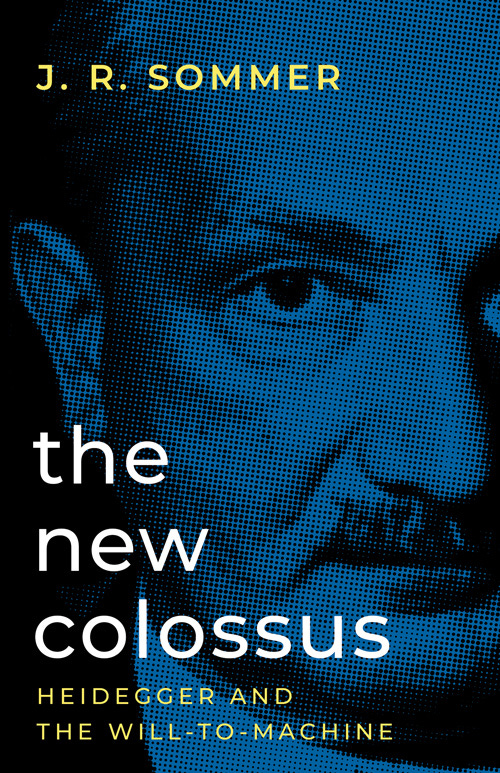The Burden of Life
by J. R. Sommer
J. R. Sommer meditates on the absurdity and meaninglessness of life corralled into social contract, the technological matrix, and dopamine addiction, shedding light on how existential angst can be the first step to freedom and authentic selfhood.
Life is a burden for which I am not equipped—this thought haunts most at some point. Increasingly, from highest to lowest, from best to worst, so many, at some time, wonder: Would it be better if I were not?
Traffic patterns define us: pedestrian or mechanized, we fall into currents that carry us to and from the things we love and hate. We often think about the self inside us—making plans, currying favor, going to battle—and we assume a certain autonomy, unaware or unconcerned with the fact that every day we exchange this self, this little hub of existence, for the convenience of caring for things standing at the center of our desire. But an exchanged self is compromised and cannot be real. Reality is the uncompromising act of a self finally willed. This thought rarely ruptures the defenses of convenience, however: traffic entrances us.
Though it was, as a function, defined in the Enlightenment, the social contract predates its definition. In the beginning was family; then came clans and peoples. Technicity and will, with us from the start, provided the means for war, itself an appurtenance of the exchange (unreality).1 The basics for life, more or less prioritized, are: air, warmth, water, food, and security—from here, several paths might be taken, though we invariably choose the path most harmful to self. This is because the last necessity—security—forms the basis of the social contract, which is the exchange of self for presumed security and convenience. What began among kin as an exercise of will to quell internal discord, expanded to the exercise of will to take from others. Bad actors, present at the outset, discovered the vigor of others can be used for personal benefit; peoples became nations became states, and the exchange of self was ushered to its logical conclusion in the exchange of commodities. The social contract, never romanticized because it was never encumbered by thought, is the means for war against the self. Security will always be the fork in the road to self-actualization, and the road ever takes us to and from what we love and hate for the material benefit of others and the spiritual detriment of all.
Transport stops and traffic lights: disembodied voices and encased colors govern our movement along society’s veins. Where are we going? Where are we going? Sadly, ironically, our assumed autonomy is magnified by newsfeeds algorithmically spoon-fed to us through mobile holding-cells. We are free to enjoy whatever the social contract deems suitable for its sustained existence. Give up gadgets and you still find yourself, one way or another, coursing along societal veins. The point is not to escape technicity, which is impossible, not to abandon society, which is inhuman, but to find the self in the midst of all the exchange. Exchange is inevitable; the self is not. The traffic permitting the imagined “us” cannot be the traffic we permit.
The imagined “us” is the basis for exchange: one does things for things; such things fill the void of a self unrealized and so provide immediate comfort; this, then, is the basis for dependency, which is the invariably chosen fork in the road of life’s essentials: We must secure the comfort and convenience of that which is unfulfilling. The social contract is the edifice of addiction—both inherent and cosmetic. This is why most are compelled to “choose a side” and will recoil at the prospect of losing that which sets the conditions for choosing. We are abusers casting dopaminergic spells on each other: the source of our imagining.
We get a dopamine hit when our side is “winning”—an analgesic for the amputee. The will-to-machine, alien and intimate, pervades all. Its edifice?—The dope of a void. Elon Musk, the “world’s richest man” who nevertheless kisses the ring, says that migration and low “birth” [fertility] rate are the West’s biggest problems, apparently confusing symptoms for source. Fertility is low because the edifice is absolutely demoralizing and dehumanizing; the West leads the world in(to) this.2 When native fertility is low, fecundity must be imported; hence the “Great Replacement.” Innovation is meant to prepare us for perpetually incited wars that enrich racketeers and conveniently displace millions who reliably migrate to the home of the innovation and incitement. These are material measures to thwart a spiritual problem: the addicts choosing sides are just too devastated and enraptured to notice or care. What to do when fomenters lament the symptoms masked by ceaseless churning and moneymaking?—Expect more of the same, perhaps.
One country (corporate state) feeds precursor chemicals into another to exploit systemic psycho-spiritual degradation. Retaliatory sanctions are imposed. Drug war turns to economic war that cues departments of war to innovate and prepare. What precedes the drug war?—Only the void left ever unaddressed. If we were to address the void, it would mean acknowledging the edificial decision we (un)autonomously made long ago; it would mean an existential self-reflection that could undermine the comfort and convenience of a dopamine hit.
A people is bombed and bulldozed into oblivion. The world’s first truly and wholly (holy) smart-city is built over their grave. It is a lucrative project that explains to global citizens the mystery of time: a pummeling into obeisance for the material benefit of a few. Might makes right means the wrong is forgotten. In time, all will be forgotten, and all will be right with the world. Even the dead forget. Our adaptability makes us all Hegelians—progress is progress, after all. But such wills-to-dope and -dominate can only be forfeitures of dominion, however; and material solutions—no matter how depraved or sophisticated—can never answer spiritual questions. The will-to-machine is the question and, more, the basis to be overcome.
All this from traffic, from churning, from movement along life’s way. We pass from student (Brahmacharya), to householder (Grihastha), to retiree (Vanaprastha), to ascetic/mendicant (Sannyasa). Meanwhile, disembodied voices and encased colors narrate the stages. Perhaps one day someone will be born into a holy smart-city and brain-linked to a cloud that uninterruptedly captures his thoughts, seamlessly blending them with artificial intelligence to generate empowering decisions; later, he will explore life’s stages with instantaneous and satisfying ease; and when he tires from an escape that simulates the austerities of self-reflection interrupting a fabricated life among the autonomous living, he can revisit the impression of misguidedness from the comfort of a riviera flat. Might makes right, and consuming technicity is never forgotten. Never Forget, Never Again: the mantra of enslavers.
The feeling of being ill equipped for life, or even feeling that life is a burden, stems from our already-uninterrupted link to the cloud of pervasive consciousness—the will-to-machine. This consciousness has never been our own. Making it so—exercising autonomy—takes determined and terrifying effort. One must, amidst the exchange, renounce and embrace the exchange. Such paradox only reflects the shortfalls of language.3 We reject the self conditioned to be a genuine operative of the social contract, which can only occur from within the edifice. This assertion of autonomy disrupts our imagined life and places us at odds with the system that made such assertion possible, which is a crisis only overcome by detachment, a prelude to liberation. It is no accident that the last life-stage is mendicant: One begs for the nourishment one rejects. This crippling stage is most uplifting: the begging is not for sustainment, but for the end. Being ill equipped for an imagined life is the subtle yearning of an assertive embrace. And the self will have never been so free.
To deeply and sincerely4 ask the question—Would it be better if I were not?—is the assertion of a primal but dormant rebellion. It is a possible first step to the freedom of self-reflection.
J. R. Sommer, The New Colossus (Arktos, 2025).
Ibid.
J. R. Sommer, The Electric Will (Arktos, forthcoming).
“... deeply and sincerely ...”, that is, with spiritual angst as opposed to material disappointment.






